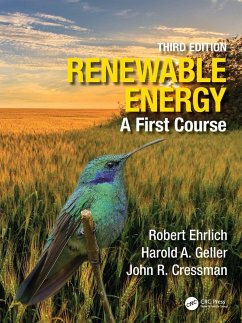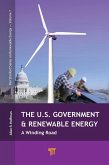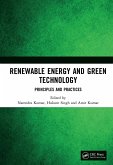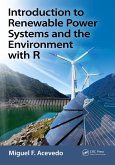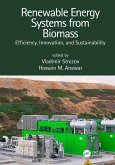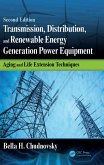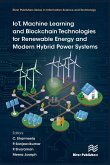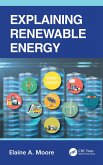95,95 €
95,95 €
inkl. MwSt.
Sofort per Download lieferbar

48 °P sammeln
95,95 €
Als Download kaufen

95,95 €
inkl. MwSt.
Sofort per Download lieferbar

48 °P sammeln
Jetzt verschenken
Alle Infos zum eBook verschenken
95,95 €
inkl. MwSt.
Sofort per Download lieferbar
Alle Infos zum eBook verschenken

48 °P sammeln
- Format: ePub
- Merkliste
- Auf die Merkliste
- Bewerten Bewerten
- Teilen
- Produkt teilen
- Produkterinnerung
- Produkterinnerung

Bitte loggen Sie sich zunächst in Ihr Kundenkonto ein oder registrieren Sie sich bei
bücher.de, um das eBook-Abo tolino select nutzen zu können.
Hier können Sie sich einloggen
Hier können Sie sich einloggen
Sie sind bereits eingeloggt. Klicken Sie auf 2. tolino select Abo, um fortzufahren.

Bitte loggen Sie sich zunächst in Ihr Kundenkonto ein oder registrieren Sie sich bei bücher.de, um das eBook-Abo tolino select nutzen zu können.
This revised edition of Renewable Energy: A First Course is fully updated and continues to provide the best in-depth introduction to renewable energy science. Updated statistics, figures, policies, trends, and technological advancements will bring the reader up to speed with the current state of renewable energy.
- Geräte: eReader
- ohne Kopierschutz
- eBook Hilfe
- Größe: 44.16MB
Andere Kunden interessierten sich auch für
![The U.S. Government and Renewable Energy (eBook, ePUB) The U.S. Government and Renewable Energy (eBook, ePUB)]() Allan HoffmanThe U.S. Government and Renewable Energy (eBook, ePUB)29,95 €
Allan HoffmanThe U.S. Government and Renewable Energy (eBook, ePUB)29,95 €![Renewable Energy and Green Technology (eBook, ePUB) Renewable Energy and Green Technology (eBook, ePUB)]() Renewable Energy and Green Technology (eBook, ePUB)108,95 €
Renewable Energy and Green Technology (eBook, ePUB)108,95 €![Introduction to Renewable Power Systems and the Environment with R (eBook, ePUB) Introduction to Renewable Power Systems and the Environment with R (eBook, ePUB)]() Miguel F. AcevedoIntroduction to Renewable Power Systems and the Environment with R (eBook, ePUB)48,95 €
Miguel F. AcevedoIntroduction to Renewable Power Systems and the Environment with R (eBook, ePUB)48,95 €![Renewable Energy Systems from Biomass (eBook, ePUB) Renewable Energy Systems from Biomass (eBook, ePUB)]() Renewable Energy Systems from Biomass (eBook, ePUB)47,95 €
Renewable Energy Systems from Biomass (eBook, ePUB)47,95 €![Transmission, Distribution, and Renewable Energy Generation Power Equipment (eBook, ePUB) Transmission, Distribution, and Renewable Energy Generation Power Equipment (eBook, ePUB)]() Bella H. ChudnovskyTransmission, Distribution, and Renewable Energy Generation Power Equipment (eBook, ePUB)52,95 €
Bella H. ChudnovskyTransmission, Distribution, and Renewable Energy Generation Power Equipment (eBook, ePUB)52,95 €![IoT, Machine Learning and Blockchain Technologies for Renewable Energy and Modern Hybrid Power Systems (eBook, ePUB) IoT, Machine Learning and Blockchain Technologies for Renewable Energy and Modern Hybrid Power Systems (eBook, ePUB)]() IoT, Machine Learning and Blockchain Technologies for Renewable Energy and Modern Hybrid Power Systems (eBook, ePUB)108,95 €
IoT, Machine Learning and Blockchain Technologies for Renewable Energy and Modern Hybrid Power Systems (eBook, ePUB)108,95 €![Explaining Renewable Energy (eBook, ePUB) Explaining Renewable Energy (eBook, ePUB)]() Elaine A. MooreExplaining Renewable Energy (eBook, ePUB)29,95 €
Elaine A. MooreExplaining Renewable Energy (eBook, ePUB)29,95 €-
-
-
This revised edition of Renewable Energy: A First Course is fully updated and continues to provide the best in-depth introduction to renewable energy science. Updated statistics, figures, policies, trends, and technological advancements will bring the reader up to speed with the current state of renewable energy.
Dieser Download kann aus rechtlichen Gründen nur mit Rechnungsadresse in A, B, BG, CY, CZ, D, DK, EW, E, FIN, F, GR, HR, H, IRL, I, LT, L, LR, M, NL, PL, P, R, S, SLO, SK ausgeliefert werden.
Produktdetails
- Produktdetails
- Verlag: Taylor & Francis eBooks
- Seitenzahl: 562
- Erscheinungstermin: 7. Juli 2022
- Englisch
- ISBN-13: 9781000606348
- Artikelnr.: 64065664
- Verlag: Taylor & Francis eBooks
- Seitenzahl: 562
- Erscheinungstermin: 7. Juli 2022
- Englisch
- ISBN-13: 9781000606348
- Artikelnr.: 64065664
- Herstellerkennzeichnung Die Herstellerinformationen sind derzeit nicht verfügbar.
Robert Ehrlich is a professor of physics emeritus at George Mason University, Fairfax, Virginia. He earned his BS in physics from Brooklyn College and his PhD from Columbia University. He is a fellow of the American Physical Society. He formerly chaired the physics departments at George Mason University and The State University of New York at New Paltz and has taught physics for nearly four decades. Dr. Ehrlich is an elementary particle physicist and has worked in a number of other areas. He has authored or edited 20 books and about 100 journal articles. His current scholarly interests include renewable energy and the existence of faster-than-light particles.
Harold A. Geller is associate professor emeritus of physics and astronomy, George Mason University. He is an adjunct professor at American University, Washington, DC. He earned his BS from the University of the State of New York, Albany, and his MA in astronomy and informatics, and his doctorate in education from George Mason University. Dr. Geller has taught physics and astronomy over thirty years. He was associate chair of the Department of Physics and Astronomy and Observatory Director; manager of Washington Operations, Consortium for International Earth Science Information Networks; program manager, Science Applications International Corporation; president, Potomac Geophysical Society; and doctoral fellow, State Council of Higher Education, Virginia. He has authored/edited nine books and published over 100 papers in education, astronomy, and biochemistry. His current scholarly interests include renewable energy, the search for extraterrestrial life, and science education.
John R. Cressman is an associate professor of physics and astronomy at George Mason University, Fairfax, Virginia. He earned his BS from Union College in Schenectady, NY, and his PhD from the University of Pittsburgh. He is the associate chair for the Department of Physics and Astronomy and teaches courses in both physics and neuroscience. He is an experimental physicist who studies systems driven far from equilibrium, from simple fluids to complex biological networks, and publishes in journals from applied mathematics to experimental neuroscience. His current area of focus is on the often dramatic transient dynamics that can occur when a controlling parameter, like temperature, of a system is changed.
Harold A. Geller is associate professor emeritus of physics and astronomy, George Mason University. He is an adjunct professor at American University, Washington, DC. He earned his BS from the University of the State of New York, Albany, and his MA in astronomy and informatics, and his doctorate in education from George Mason University. Dr. Geller has taught physics and astronomy over thirty years. He was associate chair of the Department of Physics and Astronomy and Observatory Director; manager of Washington Operations, Consortium for International Earth Science Information Networks; program manager, Science Applications International Corporation; president, Potomac Geophysical Society; and doctoral fellow, State Council of Higher Education, Virginia. He has authored/edited nine books and published over 100 papers in education, astronomy, and biochemistry. His current scholarly interests include renewable energy, the search for extraterrestrial life, and science education.
John R. Cressman is an associate professor of physics and astronomy at George Mason University, Fairfax, Virginia. He earned his BS from Union College in Schenectady, NY, and his PhD from the University of Pittsburgh. He is the associate chair for the Department of Physics and Astronomy and teaches courses in both physics and neuroscience. He is an experimental physicist who studies systems driven far from equilibrium, from simple fluids to complex biological networks, and publishes in journals from applied mathematics to experimental neuroscience. His current area of focus is on the often dramatic transient dynamics that can occur when a controlling parameter, like temperature, of a system is changed.
